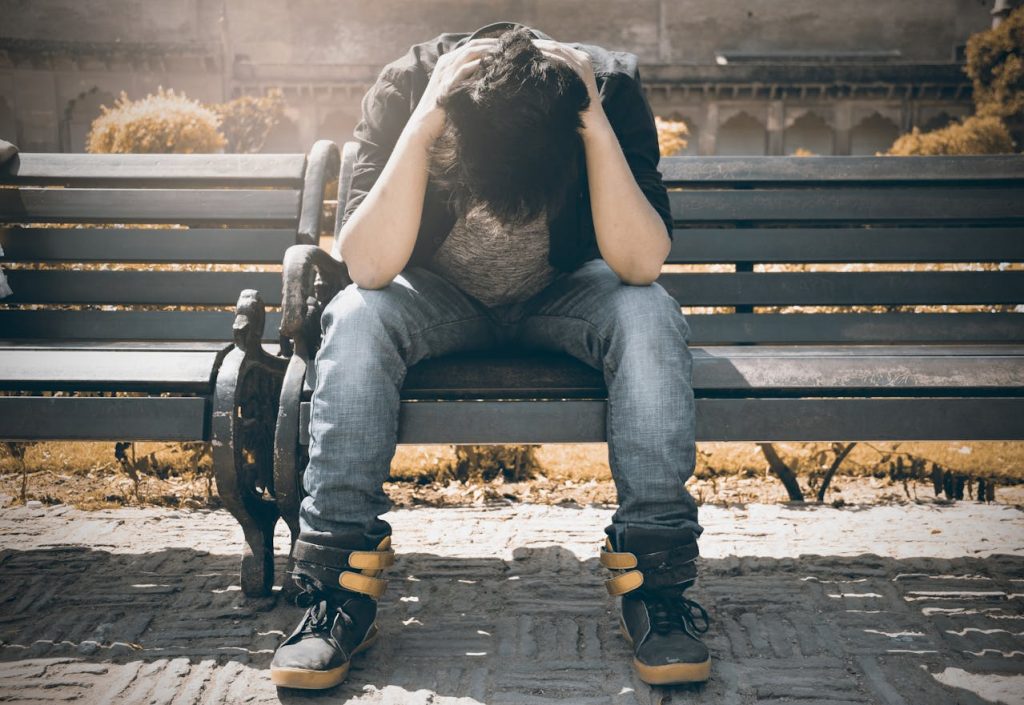The Unseen Battle: The Emotional and Physical Toll of Social Anxiety
Imagine walking into a room full of people and feeling like all eyes are on you. Your heart races, palms sweat, and you feel a wave of panic wash over you. This is the daily reality for those with social anxiety.
Often described as an invisible battle, social anxiety’s impact is profoundly real. It’s not just about feeling nervous in social situations; it’s a pervasive fear that can infiltrate every aspect of one’s life. Understanding the full extent of this anxiety’s toll is crucial for appreciating both the depth of the struggle and the importance of seeking help.

The Psychological Impact of Social Anxiety
Constant Fear and Worry
Imagine waking up every day with a heavy sense of dread, knowing that even the simplest social interactions can trigger overwhelming anxiety. This constant fear can become a mental prison, making it hard to focus on anything else. Everyday tasks like answering the phone, speaking in meetings, or even making small talk can feel insurmountable.
Negative Self-Talk
Social anxiety often comes with a relentless inner critic. You might constantly second-guess yourself, worry about saying or doing the wrong thing, and imagine worst-case scenarios. This negative self-talk can erode self-confidence and create a cycle of self-doubt that’s hard to break.

Isolation and Loneliness
To avoid anxiety-provoking situations, many sufferers withdraw from social interactions, leading to isolation and loneliness. This withdrawal can affect relationships, career opportunities, and overall quality of life. The loneliness that accompanies social anxiety can be just as painful as the anxiety itself, creating a deep sense of disconnection from others.

The Emotional Toll of Social Anxiety
Intense Shame and Embarrassment
One of the most painful aspects of social anxiety is the intense shame and embarrassment that can accompany even minor social missteps. You might replay interactions in your mind, fixating on what you perceive as mistakes. This emotional turmoil can make you feel unworthy and inadequate.
Low Self-Esteem
Constantly feeling judged and scrutinized by others can take a severe toll on your self-esteem. You might start to believe that you’re inherently flawed or inferior, which only fuels your anxiety further. Over time, this can lead to a deeply entrenched belief that you’re not good enough.
Frustration and Hopelessness
Living with social anxiety can be incredibly frustrating. You might feel trapped in a cycle of fear and avoidance, unable to break free. This frustration can lead to feelings of hopelessness and despair, making it difficult to see a way out.

The Physical Consequences of Social Anxiety
Chronic Stress
Social anxiety keeps your body in a constant state of high alert, as if you’re always preparing for a threat. This chronic stress can have serious physical consequences, including headaches, muscle tension, and digestive issues. Over time, it can weaken your immune system and make you more susceptible to illnesses.
Sleep Disturbances
The anxiety and worry that plague your mind during the day often carry over into the night, making it hard to fall asleep or stay asleep. This can lead to chronic sleep deprivation, which only exacerbates anxiety and makes it harder to cope with daily challenges.
Panic Attacks
In severe cases, social anxiety can trigger panic attacks—sudden episodes of intense fear that can include symptoms like a racing heart, shortness of breath, dizziness, and chest pain. These attacks can be so debilitating that they cause you to avoid any situation where you fear another might occur.

Behavioral Patterns Linked to Social Anxiety
Avoidance Behavior
To manage anxiety, you might start avoiding situations that trigger it. This can include everything from declining social invitations and avoiding eye contact to skipping important meetings or turning down career opportunities. While avoidance might provide temporary relief, it reinforces your anxiety in the long run and limits your life experiences.

Procrastination and Indecisiveness
Social anxiety can make decision-making incredibly stressful, leading to procrastination and indecisiveness. You might worry excessively about making the wrong choice or how others will perceive your decisions, which can paralyze you into inaction.
Substance Abuse
Some people with social anxiety turn to alcohol or drugs to cope with their symptoms. While this might provide temporary relief, it can lead to dependency and worsen anxiety over time. Substance abuse can also create additional problems, such as health issues and strained relationships.
The Ripple Effect
The toll of social anxiety extends beyond the individual sufferer, affecting relationships, career, and overall well-being. It can create misunderstandings and strain in personal relationships, as friends and family may not fully understand the extent of your struggles. In the workplace, social anxiety can limit your potential, making it hard to advance in your career or pursue opportunities that require social interaction.
The Personal Impact
Strained Personal Relationships
Social anxiety can strain personal relationships, as loved ones may struggle to comprehend the depth of your struggles. Misunderstandings may arise when you decline invitations or withdraw from social activities, leading to feelings of isolation and frustration for both you and your loved ones. Over time, this strain can erode trust and intimacy, creating a barrier between you and those closest to you.

Difficulty Forming New Relationships
The fear of judgment and rejection can make it incredibly challenging to form new relationships. Social anxiety may prevent you from engaging in conversations or attending social events where you could meet new people. This limitation can lead to missed opportunities for meaningful connections and support networks, further exacerbating feelings of loneliness and isolation.
Career Limitations and Missed Opportunities
Social anxiety can hinder professional growth and limit career opportunities. Networking events, presentations, and job interviews, which are essential for advancement, can become overwhelming and anxiety-inducing. As a result, you may miss out on promotions or exciting job prospects, impacting your professional development and long-term goals.
The Professional Impact
Impaired Communication Skills
Social anxiety can impair your ability to communicate effectively in professional settings. Fear of judgment and a constant worry about saying the wrong thing can lead to self-consciousness and self-doubt, making it challenging to articulate ideas or contribute to discussions. This communication barrier can hold you back from expressing your full potential and being recognized for your contributions.

Undermined Confidence and Self-Belief
Continuously feeling judged and scrutinized by colleagues or superiors can erode your confidence and self-belief. Social anxiety can make you doubt your abilities and qualifications, despite evidence of your competence. This self-doubt can prevent you from taking on new challenges or asserting yourself in the workplace, hindering your professional growth.
Limited Career Advancement
Social anxiety’s impact on relationships and communication can impede career advancement. The hesitation to network, engage in public speaking, or participate in team activities can limit your visibility and opportunities for growth within your organization. Over time, this can lead to stagnation and a feeling of being trapped in a job that doesn’t align with your aspirations.
The Urgency of Seeking Help
Understanding the full impact of social anxiety underscores the importance of seeking help. The emotional and physical toll can be overwhelming, but you don’t have to face it alone. Professional support, such as therapy and structured courses like my 5-day meditation program, can provide the tools you need to manage and overcome your anxiety.

Ready to Take Control of Your Social Anxiety?
Take the first step towards reclaiming your life. Book a free online consultation today and start your journey to a more confident you.
During your free consultation, you will:
- Receive personalized advice tailored to your specific challenges.
- Learn effective strategies to manage and reduce anxiety.
- Gain a clearer understanding of how to overcome social anxiety and build confidence.
In Conclusion
Living with social anxiety is a multifaceted struggle that affects every aspect of life—psychologically, emotionally, physically, and behaviorally.
By recognizing these pain points and understanding the profound impact of social anxiety, you can take the first step toward finding relief and reclaiming your life. Remember, seeking help is a sign of strength, and with the right support, you can overcome social anxiety and build a brighter, more confident future.
Additional Resources
For more tips on managing anxiety, check out our many other blog posts on Mindfulness Techniques for Anxiety.
“Social anxiety is not just about feeling nervous; it’s a pervasive fear that affects every aspect of life.”
The 5 Day Social Anxiety Course
Visit this page to learn more about my 5 Day Course on overcoming social anxiety.
What previous clients have said…
“Thanks to the consultation, I finally feel equipped to handle my social anxiety. The practical advice and support were invaluable.” – Jane W.
“Richard’s consultation transformed my life. I now have practical tools to manage my anxiety and feel more confident every day.” – Sarah K.
“The personalized advice I received from Richard was a game-changer. I can finally face social situations without overwhelming fear.” – David L.
“Thanks to Richard’s guidance, my social anxiety no longer controls me. The solutions he shared were simple yet incredibly effective.” – Emily R.
